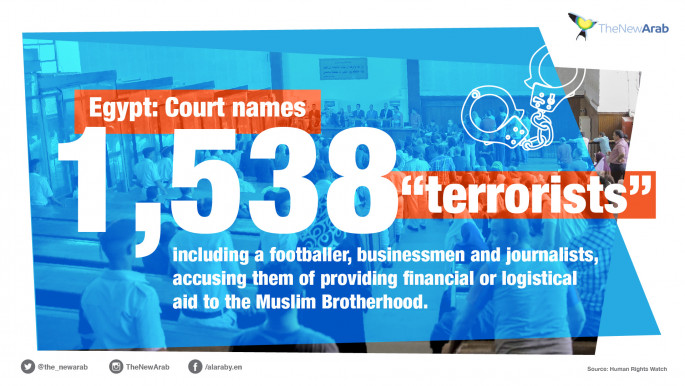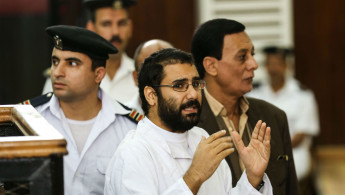Twenty-five days to stand with Egypt's Alaa Abd El-Fattah and all Egyptians
Activist and blogger Alaa Abd El Fattah is one of Egypt's leading dissident voices. He is implicated in the case along with ousted Islamist President Mohamed Morsi along with various members of the Muslim Brotherhood. These include prominent journalist Abdel Halim Qandil, TV host Tawfiq Okasha, political scientist Amr Hamzawy, former MP Essam Sultan and several others.
If found guilty, Alaa could face sentences of anywhere from a fine to further years in a maximum security prison. This would be added to his current five-year sentence.
Flawed justice
The case dates back to a complaint filed by the public prosecutor in 2012 during Morsi's presidency against a total of of 25 defendants for criticising Egypt's flawed justice system.
The charges against them are based on comments they made on the performance of the judiciary to the media, online and in parliament. Alaa's charges are due to a tweet in which he criticised the judiciary as "biased" and implied that judges are "taking orders from the military".
"Everyday we witness politicised trials and unjust sentences. This is purely a case where the judiciary wants to terrorise anyone who is questioning its entity," commented Mona Seif, Alaa's sister.
One sad irony is, she continued, is that Alaa was detained in 2006 - under Mubarak's rule - for protesting in support of judges who called for the independence of the judiciary. The same institution is now persecuting him for peaceful criticism.
While the Egyptian government has made previous claims regarding the independence of the judiciary, there are serious questions over its independence and impartiality.
Amnesty International's research has found due process shortcomings in the Egyptian judiciary. While mass death sentences and lengthy prison terms have been handed down on numerous human rights defenders, activists, lawyers and journalists following unfair trials, security forces responsible for grave human rights violations enjoy almost total impunity.
The case verdict is one of two crucial dates that will decide whether Alaa is going to spend more time behind the bars or if there could be any prospect for his release. The other crucial upcoming date for Alaa will be his first appeal hearing in the 'Shoura Council case', set for the 19 October. This is the first hearing in front of the Court of Cassation, Egypt's highest appeal court.
Solidarity
Egyptian activists launched the '25 Days to #FreeAlaa campaign' calling for displays of international solidarity to raise public awareness of these two court dates and to put pressure on the Egyptian regime.
Alaa is currently serving a five-year prison sentence -followed by five-years strict probation - on charges related to Egypt's repressive protest law. He has so far served three and a half years.
"Alaa is very vocal, influential, and well organised. The best thing [President Abdel Fatah] al-Sisi can do - from his perspective - is to lock him up and so prevent criticism and mobilisation of people," said Mohammed Zaree, Egypt office director of the Cairo Institute for Human Rights Studies (CIHRS).
"This sentence is part of the regime's wider plan to close the public sphere," he added.
Sentenced in the 'Shoura Council case', Alaa was found guilty of protesting against military trials for civilians outside the Shoura Council (the Egyptian parliament's upper house) in November 2013, where over 50 people were arrested.
The protest was the first to be forcibly dispersed in accordance with a controversial protest law introduced in the same month, which criminalises unauthorised public demonstrations.
 |
Alaa is very vocal, influential, and well organised. The best thing Sisi can do - from his perspective - is to lock up him and so prevent criticism and mobilisation of people. - Mohammed Zaree, Egypt office director of the Cairo Institute for Human Rights Studies |
 |
Despite the 'No to Military Trials for Civilians' group claiming responsibility for mobilising the protesters, Alaa was charged with incitement and organising the demonstration. The group's other members, meanwhile, were arrested but later released.
Ahmed Maher, the founder of the '6th April Youth Movement', and Ahmed Douma - another well-known activist - were later arrested on charges of organising a separate protest outside Abdeen courthouse.
Although he declared publicly that he would turn himself in for questioning, Alaa was abducted two days later and taken to an undisclosed location after police officers violently raided his home at night without a search warrant. His family was denied any information about his whereabouts.
 |
| [click to enlarge] |
"From the beginning there was a decision to stage a vindictive case, instead of abiding by the jurisdiction. The state apparatus was focussed on how to have Alaa in prison," argued Mona Seif, a well-known human rights activist. "Why Alaa wasn’t simply arrested on the same day of the protest? How come the testimonies given by the protest organisers were ignored?" she questioned.
Imprisoned
The head of the CIHRS's Cairo office implied that the judges - far from independent - were selected by the state in a way that anything related to Alaa would be twisted to provide a rationale for the fabricated charges against him.
He, and one other defendant - activist Abdelrahman Tarek Mokka of the 6th April Movement - were sentenced to five years in prison. The other 24 defendants were sentenced to three years, and they have now been given presidential pardons.
Legal observers of Euromed Rights judged the trial unfair. Alaa's imprisonment has kept him from being at the birth of his son and the funderal of his father.
Numerous human rights groups have called for his release, along with all those unjustly detained in Egypt.
"Alaa's case is not exceptional, it reflects the state's intent to shut any critical voices and crack down on the opposition movement," Seif noted. "By the end of 2013, most of the prominent activists were in prison."
Following the military-backed toppling of President Morsi in July 2013, the crackdown on the Islamist opposition widened to include secular dissenters such as the icons of the 25 January 2011 revolution.
Alaa is now held at Tora Prison, Egypt's renowned maximum security detention centre that is used to house men suspected of violent crimes and terrorism.
Blackout
As part of the campaign to release Alaa, the 25 days leading up to the 19 October hearing will see actions and public events abroad, including protests at embassies and consulates.
Samia Jaheen, storyteller and performer, is handling the campaign's Facebook page, inviting supporters to share media coverage, pictures and videos with the hashtag #FreeAlaa.
 |
We are nearly just left with Facebook and Twitter. It's like as if we have a gag on our mouths. - Samia Jaheenm |
 |
At a time of a near online blackout in Egypt - with hundreds of websites blocked inside the country - the campaigner and her team are working hard to reach out to the few sites and platforms that are not restricted and outlets that are now functioning on Facebook like Mada Masr.
"We are nearly just left with Facebook and Twitter. It's like as if we have a gag on our mouths," the campaigner sighed. "We are asking for help from outside to pass on information, mobilise media and build pressure [on the government]."
Public pressure has proven to work in the past. Detainees such as Aya Hegazy and Ibrahim Halawa were acquitted after continued media attention. The journalists prosecuted in 'the Al-Jazeera trials' were pardoned, as were dozens of political prisoners due to outside pressure.
Jaheen noted that it has been very difficult in the past few years to build any pressure that influences the regime in any way. Yet, she and other activists are not prepared to give up, wanting to the make the voices of the many imprisoned Egyptians heard.
"Our least hope is that we're not going to stay silent in the face of injustice, we cannot forget those who are left behind bars. We cannot stop fighting," she voiced.
Seif is not hopeful regarding Alaa's fate. She does not trust Egypt's justice system nor does she believe that the Court of Cassation is any less corrupt or politicised than other courts.
"Every step of the way they come up with a loophole that prolongs not just Alaa's incarceration but any legal procedure that might help release him," said the sister. "It's completely unpredictable. As a family, we are very exhausted."
She believes it will take a major shift in the country's political dynamics or change in the balance of power for Alaa or any high-profile activist to be freed.
Outside pressure
However, with no protest movement on the streets, people feeling cornered or scared to initiate anything. A lack of governmental pressure from abroad also makes it difficult to be optimistic in today’s Egypt.
"The Egyptian state is picking on whoever is critical or can mobilise the masses. They are closing all public space, afraid to see another 25 January 2011," observed rights defender Zaree.
Alaa is among an estimated 40,000 to 60,000 political prisoners kept in Egypt's jails since an unprecedented crackdown by former general - now president - Sisi on dissenters and suppression of freedoms.
During Sisi's crackdown on opposition figures, authorities have used mass arbitrary arrests to suppress dissent, detain journalists, human rights defenders and protesters. Authorities have also restricted the activities of human rights organisations.
In its last annual report, Amnesty International indicated that critics and opponents of the government continued to face arbitrary arrest and detention on charges that included inciting protests, "terrorism" - a term which is liberally applied - or belonging to banned groups such as the Muslim Brotherhood or the 6 April Youth Movement.
The authorities have also arbitarily detained several human rights defenders.
The Arabic Network for Human Rights Information (ANHRI) reported last year that Egypt has built 13 new prisons to house the increased number of Egyptians who have been imprisoned since Sisi took power in July 2013.
Amnesty also documented that more than 1,400 individuals were held beyond the two-year legal limit for pre-trial detention without being referred to trial.
Sixty percent of prisoners are being held under preventive detention, according to the deputy head of parliament's human rights committee, highlighting the suffocating conditions activists face.


![President Pezeshkian has denounced Israel's attacks on Lebanon [Getty]](/sites/default/files/styles/image_684x385/public/2173482924.jpeg?h=a5f2f23a&itok=q3evVtko)



 Follow the Middle East's top stories in English at The New Arab on Google News
Follow the Middle East's top stories in English at The New Arab on Google News


